Dogs are often referred to as “man’s best friend,” and for good reason. Their loyalty, affection, and companionship are unrivaled.
However, it’s essential to acknowledge that not all dogs are the same when it comes to temperament and behavior. While aggression in dogs can be influenced by various factors, including genetics, upbringing, and socialization, some breeds are statistically more prone to display aggressive tendencies than others.
In this article, we will explore the concept of dog aggression and learning about the breeds that tend to be associated with the most aggression.
Understanding Dog Aggression
Before delving into specific breeds, it’s crucial to understand that aggression in dogs is a complex and multifaceted issue. It’s not solely determined by breed, but rather a combination of genetic predisposition and environmental factors. Here are some common forms of aggression in dogs:
Territorial Aggression: Dogs may display aggressive behavior when they perceive a threat to their territory or home.
Fear Aggression: Some dogs may become aggressive when they feel threatened or scared. This can be a response to unfamiliar people, animals, or situations.
Protective Aggression: Dogs may become aggressive when they feel the need to protect their family members, especially children.
Social Aggression: This type of aggression can occur during social interactions with other dogs. It may result from competition for resources or social status.
Predatory Aggression: Certain breeds may display aggression when pursuing prey, such as small animals or even toys.
Medical or Pain-Related Aggression: Dogs in pain or discomfort may react aggressively when touched or approached. When dogs are aggressive with others and you might get injured, it might be a great idea to speak with a Salt Lake City dog bite lawyer.
It’s important to note that aggression can manifest differently in individual dogs, even within the same breed. Factors like training, socialization, and the dog’s specific environment play significant roles in determining behavior.
Breeds Often Associated with Aggression
While it’s crucial to recognize that a dog’s behavior depends on various factors, including individual temperament, training, and upbringing, certain breeds have historically been linked to a higher likelihood of displaying aggressive tendencies.
This association is not a definitive condemnation of these breeds but rather an acknowledgment that genetics, historical roles, and stereotypes have contributed to these perceptions. Responsible ownership and proper training can mitigate these tendencies in any breed. The breeds that are usually associated with aggression are:
Pit Bull Terrier
Pit Bulls are a broad category that includes several breeds, such as the American Pit Bull Terrier, Staffordshire Bull Terrier, and American Staffordshire Terrier. They are often at the center of debates about dog aggression due to their strength and power.
Pit Bulls can be incredibly loyal and affectionate, but they have also been involved in several high-profile attacks, which has contributed to their reputation. Responsible ownership, socialization, and training are crucial to ensuring that Pit Bulls are well-behaved and safe companions.
Rottweiler
Rottweilers are powerful and protective dogs, making them prone to territorial and protective aggression. While they have a reputation for guarding and protecting their family, proper socialization and training are essential for this breed.
German Shepherd
German Shepherds are known for their intelligence, loyalty, and versatility, but they can also display protective instincts. Their protective nature may lead to aggression if not adequately managed or if they perceive a threat to their family.
Early socialization and obedience training can help harness their protective tendencies into well-behaved behavior.
Siberian Husky
Huskies are renowned for their independent and spirited nature. While not inherently aggressive, they have a strong prey drive, which can lead to predatory aggression, especially towards smaller animals. Supervision and training are crucial for Huskies to prevent them from pursuing smaller animals.
Alaskan Malamute
Alaskan Malamutes are strong and assertive dogs, known for their endurance and determination. While not inherently aggressive, they can be territorial and may display aggression if not socialized or trained adequately. Consistent training and early socialization are essential for this breed to ensure they are well-behaved.
Doberman Pinscher
Dobermans are known for their loyalty and protective instincts.They can display aggression when they perceive a threat to their family, making early socialization and training crucial. Proper training can help channel their protective instincts into vigilant behavior.
Chow Chow
Chow Chows are known for their distinctive lion-like mane and aloof demeanor. They can be prone to territorial and fear-based aggression if not adequately socialized. Early socialization, positive experiences, and consistent training are essential to help Chow Chows become well-adjusted companions.
Keep An Open Mind With Choosing A Dog
It’s essential to approach the discussion about dog breeds associated with aggression with an open mind. A dog’s behavior depends on a range of factors, and stereotypes should not be used to judge individual dogs.
Responsible ownership, early socialization, positive training methods, and providing a loving environment play a more significant role in a dog’s behavior than their breed. Any breed, when raised with care and training, can be a loving and well-behaved companion. Remember that a dog’s behavior is ultimately a reflection of the care and attention they receive from their owner.


